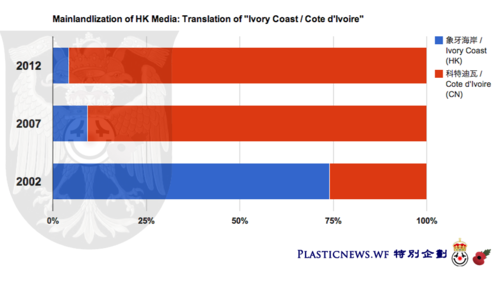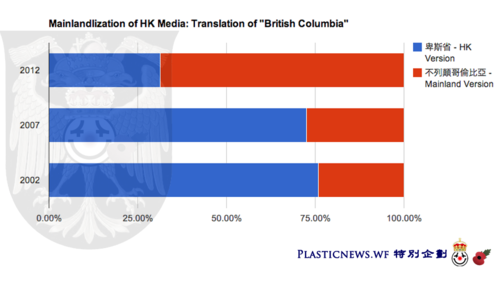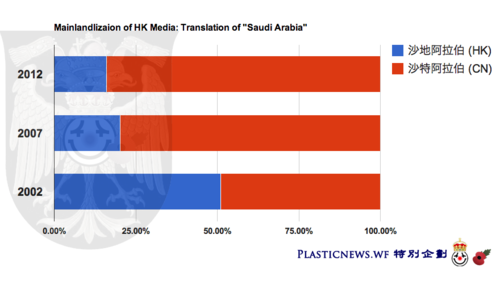
Mainlandlization of Hong Kong Media: the vanishing “Ivory Coast” (etc etc)
話說臉書上不乏媒體「大陸化」的言論,老實講感覺是很難證明。但見到多,就心癢癢看看有沒有甚麼可以拿來做數據。
Some people may be pretty annoyed, hearing locals always complaining about the “Mainlandlization” of local life. As a journalism students, I think here is a way to prove that, the local media just keep using more Mainland Chinese terms, especially when talking about “foreign place name”.
而昨日又有網友講起譯名大陸化的問題,乾脆開個「慧X搜尋」,睇睇香港的傳媒到底多少用「麻省」,又幾用「馬XXX州」(Old news is so 唔識打)。
There is a search engine called “Wisenews”, that allows digging up news articles from the HK news media, back to 1999. So I just try a few terms, with Hong Kong translation & a mainland Chinese equivalent, to see what can I get.
但其實發覺情況實際上十分混亂,有時一個媒體「朝麻夜馬」(早上是「麻省」,夜晚是「馬XXX州」),當然怎麼樣都找到一些蛛絲馬跡,例如「象牙海岸」VS「科特迪瓦」、「卑斯省」VS「不列顛哥倫比亞」和「沙地阿拉伯」VS「沙特阿拉伯」。

By counting frequencies of these different translations appearing in the media, and I found these particular 3 terms with quite interesting results: Ivory Coast, British Colombia & Saudi Arabia. These Mainland Chinese translations are seeing significantly increases in percentage of total appearance of the term.
當然可能有人講這個西非國家要求其他人叫她「科唔知mud叉」,有額外壓力,但溫哥華所屬的British Colombia,咁多香港人走過去,無官方壓力了吧?
Okay, you may say there is some government “demand” from this West African country, asking people to use the French transliteration rather than the usual English translation. But here is one more peculiar.

Actually there is a large presence of HK migrates in British Colombia, and “卑斯省” is the popular one among them, but here HK media start to switch to the Mainland version in recent years.

Finally, this one seems not so shocking, but still shows a 50/50 situation towards, a huge Chinese majority.
Anyway, this is really an early pilot of the digging, as always there are some problem.
- The Choice of translation probably is a random & personal one of editors, or simply the editorial just to be lazy to follow the “translation” of the source. Even some media use both of the translations in different news articles.
- Also we probably feel stronger in our real life, as a number of TV & radio media did use Mainland Chinese translations, which they keep repeating on their air time or 24 hours news channel. Similarly some popular newspaper use Mainland Chinese translations sometimes, but some least popular ones stick to the Hong Kong ones. The data just count “phyiscal” appearances, but didn't really reflect the frequency of our exposure to the actual translations.
- The wisenews didn't cover every media, and also articles of some media are missing in the early years (like before 2006), either the media was not yet established or their contents are not digitalized.
當然這個是很初步很初的資料探索,當然很多問題,不好意思,我懶,只提供英文版本。
Another interesting thought is that the HKSAR government keeps “importing” new expressions from the Mainland Chinese authorities. Does this also reflect on the frequency the media are using these new terms, which seems a more direct evidence of influence? Stay tuned.
搞完一輪,發覺這個方法,可能直接分析媒體使用歷任特X政府的「偽術語言」,特別是來自北面官場的字句,應該相當有趣,且聽下回分解。


